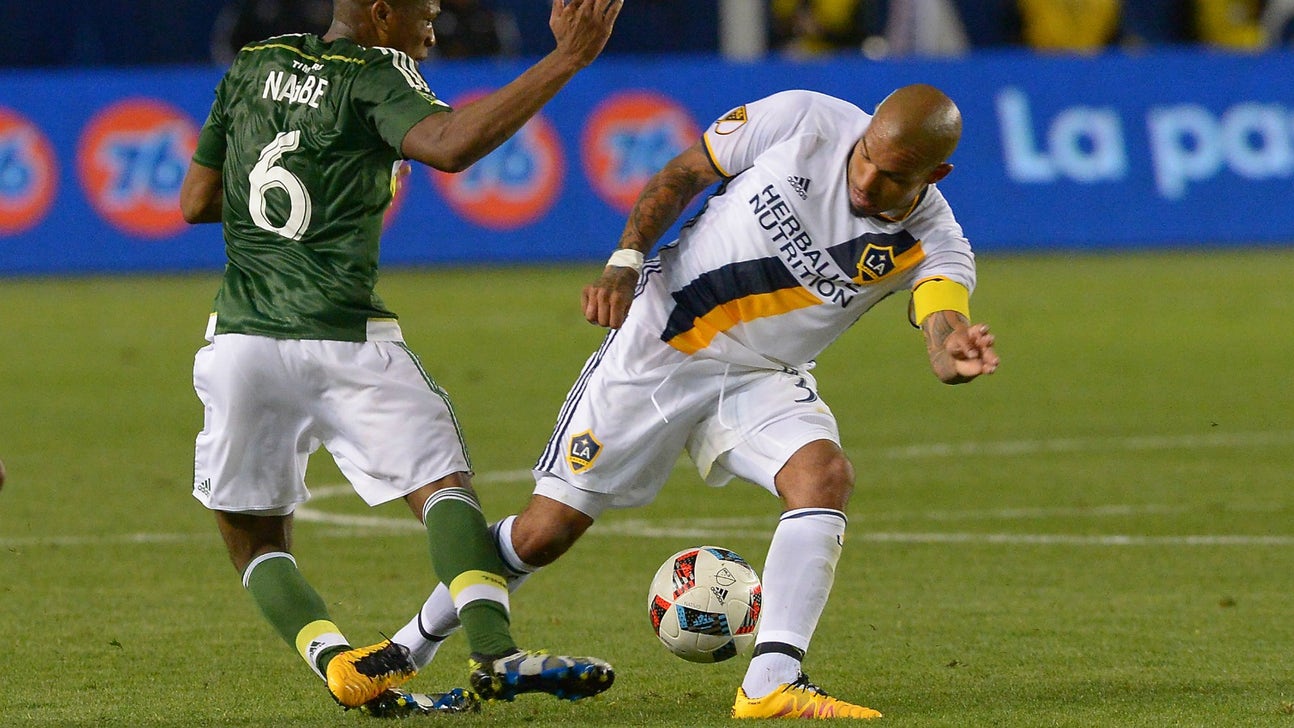
Nigel de Jong’s red card escape was a symptom of a badly refereed game

After a week of talk about the rash of red cards in MLS, the league finally made it through a weekend without anyone getting sent off. But it shouldn't have. Nigel de Jong's horror tackle on Darlington Nagbe should have seen his night end early and it brings into question not only how he avoided red, but how a match could get so out-of-hand to begin with.
There is no doubt that de Jong should have been sent off. That has nothing to do with his reputation, which is well-earned as a player all too eager to put in dangerous tackles, or the severity of Nagbe's injury - he couldn't put weight on his leg and was in a wheelchair after the match. That's a red card tackle by any player regardless of the outcome.
Ouch! @LAGalaxy's Nigel de Jong goes in hard on @TimbersFC's Darlington Nagbe, emerges with a yellow card. #LAvPOR https://t.co/sQS1EQIUZI
— FOX Soccer (@FOXSoccer) April 11, 2016
Referee Allen Chapman couldn't even argue that he didn't see the tackle - a legitimate excuse at times because one man and his two assistants are charged with seeing everything on a large pitch - because he whistled it a foul and showed de Jong a yellow card. But somehow Chapman saw it and didn't immediately reach for red. It was an outrageous decision and one that the Professional Referees Organization (PRO) will undoubtedly review.
The problem is that it wasn't entirely surprising and maybe even preventable. That's not just because de Jong has a habit of making bad tackles or because Nagbe is the most fouled player in MLS. It's because of how Chapman called the match from the very start and it only took 15 minutes for it to become clear that there was a serious threat for a major injury.
Only minutes into the match, both teams were going in on tackles late or over-aggressively. Shoulder-to-shoulder challenges looked more like shoulder and hip checks that would draw oohs and ahhs in a hockey game and all the while, Chapman continually waved play on. Nat Borchers could have been sent off for a tackle on Gyasi Zardes, but Chapman didn't call it. Another tackle on Zardes was late and reckless, but the assistant watched it from mere feet away without waving his flag and signaling for a foul. Jelle van Damme's play got more physical as the match went on, at one point nearly horse collaring a Timbers player. None of it was called.
Chapman handed out only one yellow card before showing de Jong a yellow for his horror tackle and it came on a sliding challenge from Borchers with minimal contact. It was a perfectly fine card to hand out, but it paled in comparison to the many he chose not to show. And not only was he not whistling for fouls or showing cards, Chapman didn't take time to halt play and talk to players in an effort to bring the game back under control.
With Chapman choosing to take a back seat, the match got out of hand quickly. Players were in danger, the play got choppy and no one benefited.
Would de Jong still have gone in recklessly against Nagbe had Chapman managed things differently? Maybe not. After all, de Jong has done this many times before and it's not always or even ever the referee's fault. There is only one man at fault and that is de Jong. But there is no doubt that Chapman didn't do what he could have, or should have, in the 73 minutes prior to keep things in control.

That such a tackle would take place and go underpunished is especially odd this season, one in which 16 players have been sent off already. MLS and PRO have made spotting and punishing red card offenses a priority and, so far, they've done a good job. But this one got away, and it's the most egregious one yet. But simply sending off deserving players isn't enough and getting that call right wouldn't have righted a night of wrongs.
The biggest part of refereeing is keeping a match under control and managing the 22 players on the pitch. Now consider that all of that falls to one man and you have a lot of questions about the mechanics of refereeing in soccer and can spot a litany of systematic failures, but that's how it is. And while referees can do a better job of showing red cards when needed, the biggest leap for MLS officials has to be in managing matches. It has to be in setting the tone early on, being strict when needed and talking to players to ensure things do not get out of hand.
Referees have to know which players require extra attention. In every Galaxy match, that means de Jong. After all, this is the man who has broken legs before and had no problem putting his studs through a player's chest in a World Cup final.
And when the Timbers play, the referee should have an eye on Nagbe for the opposite reason - he's a skilled player who is fouled repeatedly. That need for extra attention applies to multiple players on every team, and for various reasons. But the need is there and if the goal is to change the way the game is played in MLS then exercising additional caution around players with reputations for hacking and being hacked is entirely reasonable.
Darlington Nagbe cannot put weight on his left ankle. Needs wheelchair off the pitch. #MLS pic.twitter.com/yKLxun06VU
— Julie Stewart-Binks (@JSB_FOX) April 11, 2016
The MLS Disciplinary Committee will take a look at de Jong's tackle and, if there is any bit of sense, hand him a multi-match suspension. If player safety and eliminating dangerous tackles is a priority then it has to extend to reviews as well, and de Jong's punishment should be on the more extreme end. Then all eyes will turn to Portland, where hopefully Nagbe defies logic and escapes serious injury.
But the real spotlight will be on PRO who, to their credit, are very transparent about their work and will likely address the issue. The organization hands out assignments a month in advance, so Chapman will be back refereeing next week and the weeks after, but a month from now, he may be sat down. And it won't be simply for not showing red to de Jong. It will be for everything before it too. Because that's where it all starts and, in matches that don't have a constant threat like de Jong, that can be where the horror tackles come from.
Getting the red card offenses right is one thing. It's a big thing. But on this night, it was the easy thing. And the punishment, even after the referee got it wrong, will be even easier. Getting the rest of it right, managing the game right, is a whole other issue. The more important issue. And the issue that will truly change the way soccer is played in MLS.
